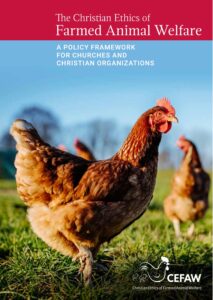CEFAW Three-Teacher Case Study

CEFAW is a research project funded by the Arts and Humanities Research Council aimed at developing a Christian ethics of farmed animal welfare for Christian institutions, with thirteen institutional partners, including major UK churches. In its final year, it has been exploring ways in which the project might inform the teaching of Religious Education and the wider practice of schools.
The project’s output includes ‘The Christian Ethics of Farmed Animal Welfare: A Policy Framework for Churches and Christian Organizations’, which provides a foundation for Christian concerns about farmed animal welfare; species-specific explanations of what farmed animals need to flourish; information about which assurance schemes support flourishing conditions; and recommendations for individual and community responses. You can download the Policy Framework, request a free copy, and find supporting resources such as a short animated video introducing the project on the Policy Framework page.
CEFAW selected 12 teachers to develop teaching materials suited to their students and schools, with support and guidance from the Research Team: Professor David Clough (School of Divinity, University of Aberdeen), Principal Investigator; Dr James Holt (Faculty of Education, University of Chester), Researcher; and Dr Margaret B. Adam (School of Divinity, University of Aberdeen), Postdoctoral Researcher.
Here, three of the participating teachers share their experiences with CEFAW Education:
Nadia Nadeem teaches Year 6 at Rose Lane Primary School, in Romford. She writes that the CEFAW Education information expanded her awareness of farmed animal welfare.
‘Some of the truths about the practices of modern-day farming are disturbing. The excess of meat consumption and lack of moderation make it essential we teach children how to lead healthy balanced lives and critically evaluate whether a product is what it claims to be. I am frustrated by the lack of support from governing bodies to ensure apt animal welfare and by a poor understanding amongst the population on the importance of healthy, nutritious and responsible consumption of food.
At Rose Lane, we already include critical thinking and being mindful, responsible humans as a core element of our curriculum. Animal welfare fits in well in our cross-cultural approach. The greatest challenge will be to ensure staff are aware of the cross curricular links and are able to reflect on prior and future learning to ensure the sequence of lessons is effective and progressive.
James Holt was fantastic in helping us to get our bearings and set the ball rolling when we were discussing what our Learning Objectives could be and how we could develop a series of lessons that are progressive in the four key areas across the primary setting. I have prepared lesson plans, quote sheets, teacher PowerPoints and facts sheets, and my students have connected with the material with lots of discussions and inspiration to make a change.
I am most excited about CEFAW Education’s ethical aspect relating to the interpretation of Dominion and Stewardship – its implementation in a practical sense and the subsequent implications for all parties. Eat little but eat well!’
Simon Archer teaches at Archbishop Tenison’s, Croydon.
‘I appreciate CEFAW Education’s cross age/stage approach that looks at how the issues of farmed animal welfare might ‘land’ with different groups, and the range of different views and approaches amongst the educators that have been involved.’
Simon notes that:
‘Farmed animal welfare fits in well with what I would ordinarily teach, as a late KS3 investigation into moral issues and practical theology.
James Holt has been great at co-ordinating and proposed brilliant and ideas and support with developing resources. I’ve been able to prepare a survey for the school, PowerPoint and worksheet materials, and specific case studies on food and faith.
I don’t think that working with other teachers as an ‘online group’ has been so effective, and developing materials in the Autumn Term – which is a very busy term – has been challenging. At the same time, the aspect of CEFAW Education that I am most enthusiastic about is helping young people discuss and encounter difficult issues in a manageable way. It’s very interesting to see how little the students have thought about these issues before being asked. I am eager for the next steps of CEFAW /Education, to see how this material can be disseminated most effectively.’
Scarlett Hayward teaches at Whitby High School in Chester. She observes that:
‘One aspect of the CEFAW Education project that has been surprising to me is the ease with which animal welfare and the politics surrounding contemporary farming can be translated to fit into the curriculum and engage students. Before engaging with the project, animal welfare, although touched on briefly, in this level of depth felt quite distant from student interests.
In KS3 we teach Environmental Ethics, including how animals are treated and the link between these two areas; in KS4, particularly within the GCSE specification, we refer to the rights of and values ascribed to animals. Farmed animal welfare stretches and challenges students further and gets them to reflect on the treatment of animals within a capacity that they will have experience of.
I have found the limited time allocated by my school to curriculum development challenging. I see students less often than other subjects in the curriculum. This should mean that certain topics which support the Locally Agreed Syllabus need to be prioritised to ensure students have an adequate understanding of them.
Working with James Holt as part of the project has been really useful. Through listening to James’ insight on pedagogy and best teaching practice, we have been able to collaborate within our subject area to produce resources which are accessible, able to be differentiated and engaging. The pedagogies discussed and deployed allow student understanding and cognition to continuously develop.
Whilst students in my school haven’t yet engaged directly with the new materials, when I have discussed the project with them many students have expressed an interest, as the questions surrounding the ethics of meat consumption and animal welfare are something they are actively engaging with both inside and outside of school.
I have prepared lesson resources including PowerPoints and supporting materials – with a particular focus on what animals need to flourish; the decisions that need to be made to run a farm and influences on this; and an assessment which considers Christian attitudes for an against animal farming.
I love the opportunity CEFAW Education provides for collaborating with like-minded professionals and academics to produce a new scheme of work which reflects upon and responds to contemporary ethical issues. I wish we had more time for face-to-face collaboration!’
The year CEFAW researchers have spent with RE teachers and a pilot group of schools has been an exciting one. It has enthused teachers about engaging with new academic research on a pressing ethical issue and using their expertise to develop learning resources that encourage their students to engage with it too. The academic members of the research team have appreciated learning from teachers about how the issues can be framed in a school context and the opportunities this provides for engaging students and questions of school practice. Teachers had the opportunity to gain academic credit for their work on the project through the University of Chester’s MA programme in Theology and Religious Studies. The project illuminates the exciting opportunities that follow from bringing teachers and academic researchers into conversation and represents a model that could be reproduced in relation to many other research areas.
 Professor David Clough, School of Divinity, University of Aberdeen
Professor David Clough, School of Divinity, University of Aberdeen
 Dr Margaret B. Adam, School of Divinity, University of Aberdeen
Dr Margaret B. Adam, School of Divinity, University of Aberdeen
 Nadia Nadeem, teacher
Nadia Nadeem, teacher
 Scarlett Hayward, teacher
Scarlett Hayward, teacher
 Simon Archer, teacher
Simon Archer, teacher